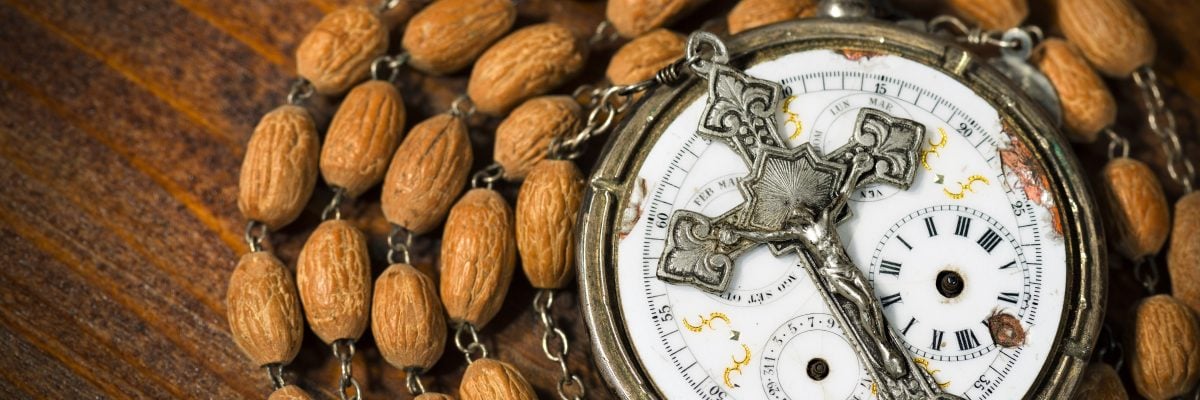
It has become somewhat popular today to speculate that Christians may be able to pray efficaciously for the dead. Not, mind you, to free the holy souls from their temporal punishment in purgatory (which is entirely biblical and Catholic) but to affect their lives in the past, before they died.
According to this theory, I could pray for my great-grandfather, who died long before I was born, and my prayers would be efficacious for him back when. If God is outside of time, the idea goes, he could apply the merits of my prayers in his eternal now where there is no past, present, or future. Thus, they could be efficacious in changing my great-grandfather’s life for all eternity!
I believe this theory is false for at least two reasons:
1. Although God indeed dwells in that “eternal now” that we speak about in Catholic philosophy and theology, we must always maintain the distinction between the creation, which was created in a state of temporality, and God’s “eternal now,” in which even the blessed in heaven can participate in only imperfectly. Thus, God knows his creation as temporal and cannot change that reality without contradicting his own wisdom, which would be tantamount to contradicting himself. And that is absurd (2 Tim. 2:12).
My great-grandfather lived his life, made his decisions for or against God, and received his particular judgment immediately upon his death. For God to help by grace to change any of his decisions, and therefore his reward at judgment, would be to contradict the temporal order that God established, which is impossible.
2. In the Summa Theologiae, St. Thomas Aquinas takes this a step further. He rightly says that changing the past would involve a logical contradiction in which it is impossible for God to involve himself—akin to creating a square circle:
[T]here does not fall under the scope of God’s omnipotence anything that implies a contradiction. Now that the past should not have been implies a contradiction. For as it implies a contradiction to say that Socrates is sitting, and is not sitting, so does it to say that he sat, and did not sit. But to say that he did sit is to say that it happened in the past. To say that he did not sit, is to say that it did not happen. Whence, that the past should not have been does not come under the scope of divine power….
[T]he Philosopher says (Ethic. vi, 2): “Of this one thing alone is God deprived—namely, to make undone the things that have been done” (Pt. 1, Q. 25, Art. 4).
But what about those who say we are not talking about making a change to the past at all; rather, that we are talking about God, who is outside of time, applying my prayers “now” to my grandfather during his lifetime?
First of all, we have to acknowledge that the Church has not declared on this matter in a definitive way. Though the Church has never prayed liturgically in such fashion, we have had such luminaries as St. Padre Pio offer Masses for the dead in this manner. Having said that, I contend this to be errant thinking for three reasons:
1. In that same article St. Thomas goes on to say:
Some things, however, at one time were in the nature of possibility, whilst they were yet to be done, which now fall short of the nature of possibility, when they have been done. So is God said not to be able to do them, because they themselves cannot be done.
Aquinas says there is a limitation on what God can do rooted in the limitation inherent in the created order. It doesn’t matter that he is “outside of time”—God cannot change something that has been done in the past, so it would be foolishness to pray for it. Whether I pray or do not pray for that past event will make absolutely no difference. If God can’t change the past, neither can my prayers.
2. The practice of the Church would seem to exclude this as a valid option for Catholics. The Church never prays for people in the past other than what we find, for example, in the Catechism, in the section on purgatory:
This teaching is also based on the practice of prayer for the dead, already mentioned in Sacred Scripture: “Therefore [Judas Maccabeus] made atonement for the dead that they might be delivered from their sin.” From the beginning, the Church has honored the memory of the dead and offered prayers in suffrage for them, above all the eucharistic sacrifice, so that, thus purified, they may attain the beatific vision of God. The Church also commends almsgiving, indulgences, and works of penance undertaken on behalf of the dead (1032).
When we pray for the dead, we pray that they might be fully and finally purified after death, never that they might (for example) repent and be baptized before death.
3. If it were true that our prayers for the dead were efficacious in that way, then the Church has done an unfathomable disservice to all of mankind by failing to make such prayers and lead the faithful to make them. Wouldn’t it be horrible if the Church failed to pray for the repentance and salvation of the living? If so, why would it not be equally horrible for the Church to fail to pray for the retroactive repentance and salvation of the dead?
Now, at this point, some will inevitably ask: “What about the Blessed Virgin Mary? In defining her Immaculate Conception, did not Pope Pius IX infallibly declare the possibility of the retroactive application of the merits of Christ backward in time?”
We declare, pronounce, and define that the doctrine which holds that the most Blessed Virgin Mary, in the first instance of her conception, by a singular grace and privilege granted by almighty God, in view of the merits of Jesus Christ, the Savior of the human race, was preserved free from all stain of original sin, is a doctrine revealed by God and therefore to be believed firmly and constantly by all the faithful.
And the answer is, of course, in the affirmative. But this is a very different matter. We have no doubt that the merits of Christ’s sacrifice could have been, and were, applied to the life of the Blessed Virgin Mary while she walked the earth. God can certainly apply the merits of Christ in a prevenient way—analogous to a person acting on a promissory note because of the trustworthiness of the one behind it.
But the application of the infallibly-certain-to-be-acquired merits of Christ to Mary did not violate the temporal order that God created because there was nothing that involved changing matters already actualized. When Mary was being conceived in the womb and living her life as the first Christian, her conception, and later her cooperation with God’s grace, were still in the realm of the possible. However, once those merits had been applied in a prevenient way and Mary cooperated with those graces, it would have been pointless to pray for those graces to be applied to Mary’s life.
From the cross, Jesus did not pray that Mary might say “yes” to the grace of God in her life. But he did petition God to forgive those whose repentance or unrepentance was still in the realm of the possible.
The central and foundational error here seems to be the conflation of God’s “eternal now” where “all moments of time are present in their immediacy” (CCC 600) and the created order, which is temporal by nature. God’s knowledge does not come as ours does—through abstracting the forms of things from particulars and then reasoning to conclusions. He knows all things, past, present, and future immediately and absolutely. That is God’s “eternal now.”
But God’s immediate of the past and future does not mean that the past and the future actually exist so that God can affect change in either. “Now is the day of salvation,” says St. Paul in 2 Corinthians 6:2, because “now” is all we have! And, because of the limitation of this created order, “now” is all God has to act in toward his creation as well. Otherwise, we run into all kinds of confusion. For example, if all moments of time exist not just immediately and absolutely in God’s cognition, but in actuality, then I am actually being born and dying right now, which is absurd.
No, folks! God knows me just as I am in reality. But God “sees” or comprehends fully and absolutely both my past and my every future and even contingent actuality that will ever be.
So can we pray for events that have already occurred? I suppose we could. But unlike the prayer of the righteous man in James 5:16, it would have no “power in its effects.”



